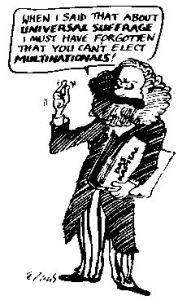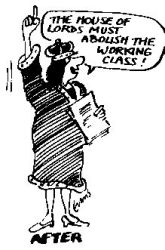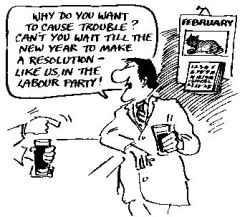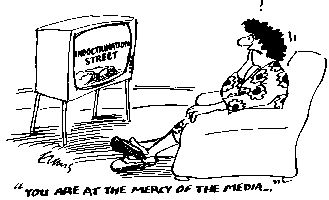MIA > Archive > P. Foot > 3 Letters
THANKS for adding ‘Happy New Year’ at the end of your letter, to reassure me that we are still friends. We’ve had all these arguments out before, but I never remember you quite so angry. You accuse me of ‘crowing’ over your political predicament as though I take some sort of pleasure in seeing other socialists in discomfort. I assure you that is not so, and you have misread me. I’ll come later to what I really feel about you and all who think like you, but first I must answer an even more urgent charge.

You say, with some justification, that ‘like all sectarians’ I spend 99 percent of my time and energy attacking everyone else and only 1 per cent offering any sort of solution. As an example, you take a paragraph at the end of my last letter criticising your ‘obsession with electoral polities’. Just what does that mean, you ask? Am I against any elections at all? Do I imagine that society can be changed by some kind of coup? Is my socialism a system where the advance guard of the working class appoint themselves to rule with the help of compulsory examinations in the writings of Marx and Lenin?
No, I am not against elections. I think that anyone in political or economic authority over anyone else must be elected – or the authority is illegitimate. I am for a ‘representative democracy’ every bit as much as Tom Paine was when he wrote The Rights of Man nearly 200 years ago.
Indeed, a representative democracy is, as far as I am concerned, central to socialism. The difference between a socialist and a non-socialist democrat is that the socialist wants democracy in every field of public life. We want economic and industrial democracy as well as parliamentary democracy. We want to see not just those who make the laws elected, but those who enforce them elected too – the judges, the police, the armed forces. We want to see those in authority in the factories and workplaces subject to election too, and those who control the media.
Socialism, in other words is an extension of what democracy we have, not the removal of it.
What is true of our vision of socialism is also, as it must be, true of our attitude to the labour movement now. What use is a shop steward, for instance, unless he or she is elected by the union members he or she represents, and can be recalled by them? Similarly, isn’t it obvious that one of the main failings of the union leaders is their lack of accountability to their members? We are in favour of the regular election of all union officials, as for instance takes place in the engineering workers’ union, the AUEW.
Equally, there is for me nothing more humiliating or debasing in the movement than a rigged trade union election.
I also object when I am described as ‘anti-parliamentary’, as though I were in favour of dispensing with votes for parliament and local authorities, as any Fascist is. I am not.
I realise just as you do that the right to vote, and all the other freedoms which spring from that, which include for instance the right to publish Socialist Worker, were rights won from the propertied hierarchies of the past. The idea that everyone should vote for their government didn’t come from the reforming consciences of the rich, who once ruled quite happily through a parliament which wasn’t remotely democratic. It came from the growing clamour of the voteless people; their marches, meetings, demonstrations and strikes. It came out of the agitations of Chartists and suffragettes. And it was conceded reluctantly, gingerly, in dribs and drabs over a hundred years (if you include giving the vote to 18-year-olds, well over a hundred years).
These concessions went against the grain of the ruling hierarchy, and to some extent they still run against the grain. So whenever there is a clash between one or other of the unelected hierarchies and the elected representatives, we socialists instinctively support the parliament and the councils.
When the Law Lords declared the other day that the elected Greater London Council could not subsidise transport and fares as it had promised in its Labour manifesto, there was no question of standing aside and laughing at the ‘dispelling of reformist illusions’. I was outraged every bit as much as you were, and determined to do everything I could in unconditional defence of the elected GLC against the unelected Law Lords.
It follows as night follows day that if anyone tried to take away the vote, to postpone elections, or anything of that kind, we would be even quicker off the mark than you to defend the elections and insist upon them.
But we are talking about change, are we not? At the very least we want to change society substantially in favour of the poor and the dispossessed, and therefore against the interests of the class that controls the wealth and property. And the most extraordinary thing about parliamentary democracy is the degree to which it has been allowed to develop without ever threatening the people in unelected power.
This is not because political parties haven’t promised a different system, in their resolutions and manifestos. For eighty years your own party has been making the most amazing promises that it will bring us socialism.
In 1923, before it formed its first government, the Parliamentary Labour Party put a motion down calling for laws to enact ‘a gradual supercession of the capitalist system’. And in 1973, you’ll remember, before its last period of government, Labour’s Programme called for a ‘fundamental and irreversible shift of wealth and power towards working people and their families’.
In the fifty years in between, there have been promises galore. But there has not been a gradual supercession of the capitalist system. On the contrary, the system has survived extremely well.
Have you ever come across a book called The Labour Government and British Industry by A.A. Rogow and Peter Shore? (Yes, I kid you not, the same Peter Shore who now denounces you for fraternising with extra-parliamentary hooligans). The book is a brilliant indictment of the 1945-1951 Labour government, which was the strongest ever. It had a majority of 140 over all the other parties, and it didn’t lose a single by-election in six years. It had the overwhelming support of most of the British people. Yet, as Rogow and Shore show, far from ‘gradually superceding’ the capitalist system, that government carefully nurtured it and built it up strong again – so strong in fact that it was able to gather its forces, regroup, revamp its propaganda and knock the Labour government out of office!
Harold Wilson, President of the Board of Trade in that government, masterminded the ‘bonfire of controls’ in 1949 which restored power over industry, which had been placed during war-time into the hands of bodies responsible to parliament, to unelected ‘private enterprise’. He later became your leader and prime minister. He promised ‘a new Britain forged in the white heat of the technological revolution’. Under his first regime, from 1964 to 1970, when Labour again had a handsome majority, pledge after pledge to move to a more equal and publicly-controlled society was pushed aside by actions – forged no doubt, in white heat – for which there were no pledges: freezing wages, doubling unemployment, imposing health charges, and supporting an imperialist war by the US in Vietnam.
I won’t annoy you even more by going over the experience of the last Labour government, except to say that in its last three years, from 1976 to 1979, it achieved what no other Labour or Tory government since the war had managed: a shift in wealth and power away from working people and to the rich! And Margaret Thatcher and company have made sure that shift is pretty fundamental and irreversible!

You mischievously remind me of a quotation from Karl Marx a hundred and thirty years ago, in a famous essay about the Chartists. ‘Universal suffrage,’ he wrote, ‘is the equivalent of political power for the working classes in England.’ The ‘inevitable result’ of votes for all, he went on, ‘is the political supremacy of the working class’. Yet in our lifetime we have lived through three periods of Labour government, all of them with majorities, in which that supremacy should have been achieved, but during which the propertied class easily held on to its power, its wealth, its influence, and therefore its political supremacy.
Your governments and ministers wanted to change society all right. But their power to change things was constantly frustrated by the unelected powers outside parliament. I always laugh when I read in the Tory press about ‘government interference in business’, since the real problem is business interference in government. The methods used are many and various: the run on sterling bringing the collapse of the pound; an investment strike causing loss of jobs in industry; the flight of capital abroad, causing balance-of-payments problems; the Law Lords and the House of Lords preventing parliament passing the measures it wants; the civil service mandarins not putting such measures into action; the independent action of police or prison officers; the mutinies of army officers; the constant barrage of a Tory-controlled media – all of these and others have been used to push Labour governments into reverse gear.
Perhaps the most striking metaphor ever used to describe this sad process comes from your former hero Harold Wilson. In his boring account of his second term of office as Prime Minister, from 1974 to 1976, he describes in a sudden flash of an old anger, how the entire economic and industrial policy of his government was changed against its will in the early summer of 1975 (just as soon as he had obliged big business by supporting a ‘Yes’ vote in the referendum on the Common Market).
He still hoped, he wrote, to patch up an agreement with the unions which would save him sliding into the wage restraint which he and all his Ministers had so powerfully denounced at two elections the previous year. He writes:
‘We were living on borrowed time. But what of the bailiffs, in the shape of the international financial community, from cautious treasurers of international corporations, multinationals, to currency operators and money speculators? Would they give us time – to win the support of the miners and take all necessary corrective action? The answer came on 30th June.’
The answer was no, in the shape of the biggest slide in the value of the pound in living memory, and Labour and the union leaders were stampeded into wage restraint, into watering down the Industry Bill, into shifting Tony Benn from the Industry Ministry, and all the other familiar sell-outs which you know so well.
The bailiffs! What a turn of phrase! Wilson saw his elected government as tenants whose security of policy was subject to the greedy whims of bailiffs. Just as in 1948-1950, and 1966-1970, the unelected bailiffs evicted the elected government from their policy!
It is not all that surprising, when you come to think of it. These Labour governments are nothing but a handful of individuals backed by votes. They do not have any real control over industries, services, money, laws, guns or the media. The people who do control these things are ranged implacably against them. By their own logic, the Labour Ministers cannot resort to any ‘outside power’ lest they be accused of ‘anti-Parliamentary action’. So they don’t really stand a chance, do they?
And neither do you stand a chance of changing society in the way you want through another such government, however radical its proposals or its commitment.


Someone once said that Labour MPs go to parliament to change the world, and by the time they leave (for retirement or the House of Lords) the only noticeable change is in themselves. That’s more than just a joke. The effect of all the compromise, sell-out and humbug that is forced on the Labour Party in parliament is widespread demoralisation both among the MPs themselves and among the enthusiastic socialists who worked to get them there.
Just as the House of Lords is stuffed with Labour peers who once swore to abolish it, so the constituencies are full of people who joined the Labour Party for a ‘co-operative commonwealth’, as the old Labour slogan had it, but left it as they watched their heroes shoring up unco-operative capitalist chaos.
To go back to your quotation from Marx: I think he underestimated the power of the ruling class, and their will to hold on to what they have in spite of universal suffrage. And there was something else he didn’t anticipate. The pace of elections and of electoral politics is out of step with the struggle between the classes which he so brilliantly described.
Electoral politics comes to a formal and unnatural climax every five years or so. Then, and only then, are people allowed their choice. The sensitivity of the elected representatives to those who elected them rises during election times, but in between times it is dulled.
Yet in those ‘between times’ tremendous developments happen which can shake the foundations of society. In France in May 1968 a general strike led to the most extraordinary rise in the aspirations of working people. For a few exhilarating weeks it seemed possible that the whole social order could be overthrown, so strong did the workers feel themselves. But the initiative was not seized, and almost in a flash the enthusiasms and excitements of the strike faded into nothing. An election held only a few months later showed a swing to the Right.
Yet an election held at the height of the strike would have returned all sorts of ‘extremists’ to parliament. So it is in the interests of the powers-that-be to hold off elections until the people have ‘calmed down.’
Similarly, on a more mundane level, battles in industry, or economic recessions, take place to a different timetable to that of parliamentary elections. And those socialists who call themselves ‘politicians’, who interest themselves only in elections and parliamentary processes, tend to get irritated with struggles which ‘get in the way of their carefully worked-out (but never fulfilled) programmes. So it is that often Labour Party members who led strikes and formed unions before they were selected and then elected to parliament, become, as MPs, at least suspicious, and at worst downright hostile to what they see as ‘mindless (that is, unparliamentary) militancy’.
The whole process encourages passivity: ‘Don’t do anything now,’ runs the advice, ‘just wait till the next conference or the next election.’
With all this experience behind us, then, where is the prospect for real change? Is it in getting Labour governments repeatedly elected, however unlikely that may be? Or is it in the activity, and confidence which results from that activity, of the working people themselves?
To put it bluntly, I think there is more hope of change in a single strike to save jobs than in a thousand Labour Party resolutions on how to solve unemployment. I think there is more hope for peace in a single mass demonstration against nuclear weapons than in a thousand declarations for disarmament intended to bind a future Labour government. I see more prospect for a better community in a series of local sit-ins and protests to save, say, a hospital or a school, than in a thousand promises from Labour councillors or MPs.
For I think that what really counts is the success our side is having in the course of the tussle between the classes, and I think that we have more than enough proof that reliance on elections does not guarantee us any success whatever.
Now I know that these ideas have been worrying you and many of your friends. I read Peter Tatchell’s article in Labour Briefing which got him into so much trouble. He was saying no more than countless decent socialists in the Labour Party have been saying for four generations. Sir Stafford Cripps put it pretty well in 1933:
‘It is this determination to seize power from the ruling class and transfer it to the people as a whole that differentiates the present political struggle from all those that have gone before.’
Cripps and his supporters in the 1930s argued for extra-parliamentary action both before and after the election of a Labour government to ensure its election on socialist policies and its adherence to them, once in office. Peter Tatchell says something like it today. In a lot of what Tony Benn says there is the suggestion that a future Labour government must be safeguarded against the betrayals of past ones by mass action, strikes, sit-ins, and demonstrations among the workers who elected it.
This narrows the gap between us, but the gap is still there.
You say that the ‘first priority’ is to get a Labour government elected on socialist policies, and the second to make sure that it is backed by the actions of the rank and file.
I say that the first priority is to stiffen the resistance and increase the confidence of the rank and file, and that any parliamentary or electoral politics should be used for that purpose, and be seen as secondary to it.

Excuse me just for a moment if I slip into jargon. You are inclined to particularise from the general. That is, you start with your socialist programme and your strategy for electing a socialist Labour government, and go on to say that any particular action, strike, demonstration, agitation should be adapted to that end. I prefer to generalise from the particular, to start with the strikes or agitations and seek to generalise from them into a socialist strategy which can take off from there.
How do you think peoples’ minds can be changed? Do you think they will change just through listening to Tony Benn on the television or reading pamphlets and so on? Some people’s minds do change that way. But most people are inclined to think the way they feel. Their own experience, their environment, and their commitments, their immediate fears and hopes govern the way they think.
So there is often a great gulf between the way people think about their own circumstances and the way they feel about things in general. A majority of trade unionists, we are told by the polls, think that the unions are too powerful and should be curbed. They are almost unanimously against secondary picketing. A week or two ago, I went up to Doncaster and talked to some of the workers from Laurence Scotts, a factory in Manchester, who were engaged in an ‘illegal’ secondary picket of a mining supplies firm. They told me that if they were to save their jobs, then they had to picket that firm.

These were workers who, before their factory was threatened with closure, had never been on strike. I am sure that if a pollster had gone there before the dispute and asked: ‘Do you agree with laws against secondary picketing?’, there would have been an overwhelming vote ‘Yes’. But now their own experience has changed their minds. If you stick to the conventional processes of electoral politics, that is to general statements and general arguments, then you are at the mercy of the Tory-run media, which are much better than you at putting and distributing their point of view. When issues seem distant to people, they tend to believe what they are expected or encouraged to believe. But when the issues are close, when they impinge directly on people’s lives, especially when people are engaged in some action in their own interests, then often they see things entirely differently from the way the powers-that-be would like.
How does all this relate to the Labour Party and to your determination to ‘stay in the Labour Party in order to change it’?
One thing you can’t change about the Labour Party is that it was formed to get parliamentary representation for the trade unions, and that remains its key function however much you change its direction or its policies. And because that is its main function you are always bound by the Gallup-inspired views of people as voters, not as human beings whose views change with their confidence and their ability to affect their own destiny. You are tied down to the business of winning elections, and therefore to chopping and changing to accommodate the right wing. And precisely because of the distance between peoples’ ideas when they are fighting and the ideas which they are simply expected to form in order to vote, the right wing of the party is not only necessary for the party’s survival, it will in 99 cases out of a hundred call the tune.
This is shown by the Left’s predicament, which I harped on to your obvious fury in my last letter. You did change the Labour Party. You pushed its policy to the Left; you got a better and more democratic way of electing its leaders; you nearly won a motion that the election manifesto should be written by the executive; you established a system of compulsory reselection for MPs; you enormously weakened the influence of the Parliamentary Party – you had all these triumphs, but after all of them, you find yourself dragged back more sharply to the right than at any time in the history of the last forty years. Why should anyone now believe that the Labour Party can be moved to the left and kept there while it forms a government?
In the end, it comes to this. You still see the main hope for change in an elected Labour government, backed by supporters in the rank and file, passing and enforcing laws to establish a socialist order. I see the only real prospect for change in a growing movement from below, culminating in a revolutionary process, where so many working people are confident of their own ability to run society that they seize hold of economic and industrial power, and use it.
We can argue forever about which is the more likely proposition (though I think you must concede that the gap is closer now that it was when we first started arguing twenty years ago!) But let’s not do that. Let’s come back to your own position. What are you going to do?
What I fear is that the electoral priorities of your politics will force you into spending the whole of 1982 in a ceaseless squabble inside the Labour Party; that the non-endorsement of Peter Tatchell, the inquiry into the Militant Group, the refusal of membership to Tariq Ali, will force you to counter-attack by spending hours with your colleagues in innumerable meetings devoted entirely to internal party matters.
I know the fact that you are likely to lose will not dissuade you. Judging from your last letter you already acknowledge, for instance, that if Tony Benn fights again for the deputy leadership, the unions will unite against him and he will do much worse than in 1981. If anything, I suppose, such is your stubborn nature, that will inspire you to still more hectic intriguing!
What worries me about that is precisely what I have been arguing all through this letter: the distance that will grow between you and the real struggle that goes on outside ward meetings and general management committees.
We have seen some signs of this even when you and your friends were winning in the Labour Party. Here’s one. Last year, Mike Cooley was sacked from Lucas. Mike is one of the most militant and principled rank and file trade unionists in the country. He is known way outside Lucas as someone who wanted to use the technology and know-how of that huge engineering concern to improve peoples’ lives, rather than to destroy them. But he is not a starry-eyed idealist. He believes above all in the strength of his trade union at shopfloor level.
He was a menace to Lucas, and they fired him on a trumped-up charge. His union, TASS, which has just saved the job of another militant by militant action, backed off. They went through the motions, but in the end were prepared to see Mike Cooley lose his job.
Yet the leaders of this same union were some of your loudest allies in your battle to get Tony Benn elected as Labour Party deputy leader. Their votes and their voices were thrown wholesale into the Benn Campaign, while Mike Cooley signed on the dole.
Or again. While working around the small disputes of 1981, occupations and strikes like those at Lee Jeans or Laurence Scotts, you wouldn’t think there was a great revolution underway on the Left. A terrific battle had to be waged even for nominal solidarity for these disputes. There were some SWP members I know who got quite angry when they heard of another meeting of 2000 people to listen to Tony Benn in a city where not 20 had been prepared to do anything to help the Laurence Scott workers save their jobs.
This was when you were winning. What is going to happen when you are losing?
I don’t know whether or not the industrial downturn will go on through 1982. But I do know that there will be struggle, whatever the pitch of it. There will be strikes and occupations and sit-ins and demonstrations. Where will you be with all your grand ideas for changing society? Are you really going to spend your time locked in Labour Party meetings, digging in for long resolutionary trench warfare, waiting to go over the top at the Winter Gardens in October?
Surely the least I can do is beckon you out of these futile feuds and into the struggle where it is really being fought.
Last updated on 28.11.2004